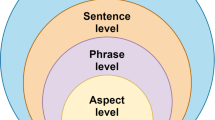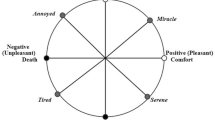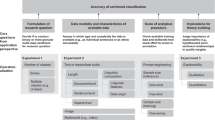Abstract
With the rapid growth of web technology and easy access of internet, online shopping has been increased. Now people express their opinions and share their experiences that greatly influence new buyers for purchasing products, thereby generating large data sets. This large data is very helpful for analyzing customer preference, needs and its behavior toward a product. Companies face the challenge of analyzing this sheer amount of data to extract customer opinion. To address this challenge, in this paper, we performed sentiment analysis on the customer review real-world data at phrase level to find out customer preference by analyzing subjective expressions. Then we calculated the strength of sentiment word to find out the intensity of each expression and applied clustering for placing the words in various clusters based on their intensity. We also compared the results of our technique with star-ranking given on the same dataset and found the drastic change in our results. We also provide a visual representation of our results to provide a clear insight of customer preference and behavior to help decision makers for better decision making.










Similar content being viewed by others
Notes
A subjective expression is any word or phrase used to express an opinion, emotion, evaluation, stance, and speculation.
References
Smith, A., Anderson, M.: Online Shopping and E-Commerce. Pew Research Center, Washington, DC (2016)
Liu, B.: Sentiment analysis and subjectivity. In: Indurkhya, N., Damerau, F.J. (eds.) Handbook of Natural Language Processing, 2nd edn. CRC Press, Boca Raton (2010)
Asghar, M.Z., Ahmad, S., Qasim, M., Zahra, S.R., Kundi, F.M.: SentiHealth: creating health-related sentiment lexicon using hybrid approach. SpringerPlus 5, 1139 (2016)
Hutto, C.J., Gilbert, E.: Vader: a parsimonious rule-based model for sentiment analysis of social media text. In: Eighth International AAAI Conference on Weblogs and Social Media (2014)
Wang, H., Can, D., Kazemzadeh, A., Bar, F., Narayanan, S.: A system for real-time twitter sentiment analysis of 2012 US presidential election cycle. In: Proceedings of the ACL 2012 System Demonstrations, pp. 115–120 (2012)
Nielsen, F.Å.: A new ANEW: evaluation of a word list for sentiment analysis in microblogs (2011). arXiv:1103.2903
Medhat, W., Hassan, A., Korashy, H.: Sentiment analysis algorithms and applications: a survey. Ain Shams Eng. J. 5, 1093–1113 (2014)
Bai, X.: Predicting consumer sentiments from online text. Decis. Support Syst. 50, 732–742 (2011)
Cambria, E., Schuller, B., Xia, Y., Havasi, C.: New avenues in opinion mining and sentiment analysis. IEEE Intell. Syst. 28, 15–21 (2013)
Archak, N., Ghose, A., Ipeirotis, P.G.: Deriving the pricing power of product features by mining consumer reviews. Manag. Sci. 57, 1485–1509 (2011)
Taboada, M., Brooke, J., Tofiloski, M., Voll, K., Stede, M.: Lexicon-based methods for sentiment analysis. Comput. Linguist. 37, 267–307 (2011)
Kang, H., Yoo, S.J., Han, D.: Senti-lexicon and improved Naïve Bayes algorithms for sentiment analysis of restaurant reviews. Expert Syst. Appl. 39, 6000–6010 (2012)
Wang, S., Li, D., Song, X., Wei, Y., Li, H.: A feature selection method based on improved Fisher’s discriminant ratio for text sentiment classification. Expert Syst. Appl. 38, 8696–8702 (2011)
Ravi, K., Ravi, V.: A survey on opinion mining and sentiment analysis: tasks, approaches and applications. Knowl. Syst. 89, 14–46 (2015)
Ye, Q., Zhang, Z., Law, R.: Sentiment classification of online reviews to travel destinations by supervised machine learning approaches. Expert Syst. Appl. 36, 6527–6535 (2009)
Kouloumpis, E., Wilson, T., Moore, J.D.: Twitter sentiment analysis: the good the bad and the OMG!. ICWSM 11, 164 (2011)
Saif, H., He, Y., Alani, H.: Semantic sentiment analysis of twitter. Semant. Web-ISWC 2012, 508–524 (2012)
Barbosa, L., Feng, J.: Robust sentiment detection on twitter from biased and noisy data. In: Proceedings of the 23rd International Conference on Computational Linguistics: Posters, pp. 36-44 (2010)
Wilson, T., Wiebe, J., Hoffmann, P.: Recognizing contextual polarity in phrase-level sentiment analysis. In: Proceedings of the Conference on Human Language Technology and Empirical Methods in Natural Language Processing, pp. 347–354 (2005)
Pennebaker, J.W., Mehl, M.R., Niederhoffer, K.G.: Psychological aspects of natural language use: our words, our selves. Ann. Rev. Psychol. 54, 547–577 (2003)
Lu, Y., Kong, X., Quan, X., Liu, W., Xu, Y.: Exploring the sentiment strength of user reviews. In: International Conference on Web-Age Information Management, pp. 471–482 (2010)
Eirinaki, M., Pisal, S., Singh, J.: Feature-based opinion mining and ranking. J. Comput. Syst. Sci. 78, 1175–1184 (2012)
Deng, Z.-H., Luo, K.-H., Yu, H.-L.: A study of supervised term weighting scheme for sentiment analysis. Expert Syst. Appl. 41, 3506–3513 (2014)
Agarwal, A., Xie, B., Vovsha, I., Rambow, O., Passonneau, R.: Sentiment analysis of twitter data. In: Proceedings of the Workshop on Languages in Social Media, pp. 30–38 (2011)
Khan, F.H., Bashir, S., Qamar, U.: TOM: Twitter opinion mining framework using hybrid classification scheme. Decis. Support Syst. 57, 245–257 (2014)
Asghar, M.Z., Khan, A., Ahmad, S., Qasim, M., Khan, I.A.: Lexicon-enhanced sentiment analysis framework using rule-based classification scheme. PLoS ONE 12, e0171649 (2017)
Mostafa, M.M.: More than words: social networks’ text mining for consumer brand sentiments. Expert Syst. Appl. 40, 4241–4251 (2013)
Asghar, M.Z., Khan, A., Ahmad, S., Khan, I.A., Kundi, F.M.: A unified framework for creating domain dependent polarity lexicons from user generated reviews. PLoS oNE 10, e0140204 (2015)
Kontopoulos, E., Berberidis, C., Dergiades, T., Bassiliades, N.: Ontology-based sentiment analysis of twitter posts. Expert Syst. Appl. 40, 4065–4074 (2013)
Bell, D., Koulouri, T., Lauria, S., Macredie, R.D., Sutton, J.: Microblogging as a mechanism for human-robot interaction. Knowl. Syst. 69, 64–77 (2014)
Popescu, O., Strapparava, C.: Time corpora: epochs, opinions and changes. Knowl. Syst. 69, 3–13 (2014)
Neviarouskaya, A., Prendinger, H., Ishizuka, M.: SentiFul: a lexicon for sentiment analysis. IEEE Trans. Affect. Comput. 2, 22–36 (2011)
Asghar, M.Z., Khan, A., Ahmad, A., Kundi, F.M.: Preprocessing in natural language processing. Emerg. Issues Nat. Appl. Sci. 10, 152–161 (2013)
Ohsawa, Y., Benson, N.E., Yachida, M.: KeyGraph: automatic indexing by co-occurrence graph based on building construction metaphor. In: Proceedings. IEEE International Forum on Research and Technology Advances in Digital Libraries: ADL 98, pp. 12–18 (1998)
Lee, D., Jeong, O.-R., Lee, S.: Opinion mining of customer feedback data on the web. In: Proceedings of the 2nd International Conference on Ubiquitous Information Management and Communication, pp. 230–235 (2008)
https://nlp.stanford.edu/IR-book/html/htmledition/evaluation-of-clustering-1.html. Accessed 20 May 2017
Author information
Authors and Affiliations
Corresponding author
Rights and permissions
About this article
Cite this article
Riaz, S., Fatima, M., Kamran, M. et al. Opinion mining on large scale data using sentiment analysis and k-means clustering. Cluster Comput 22 (Suppl 3), 7149–7164 (2019). https://doi.org/10.1007/s10586-017-1077-z
Received:
Revised:
Accepted:
Published:
Issue Date:
DOI: https://doi.org/10.1007/s10586-017-1077-z




